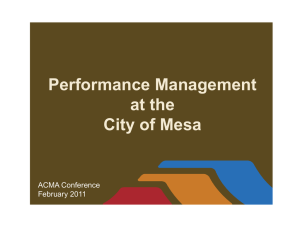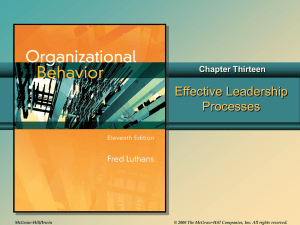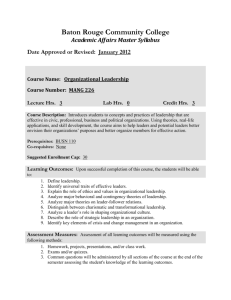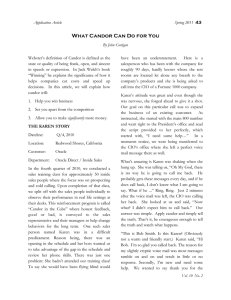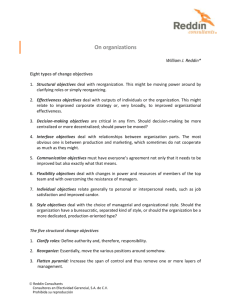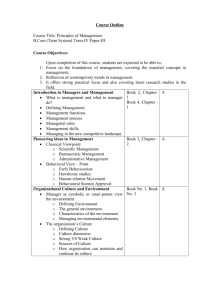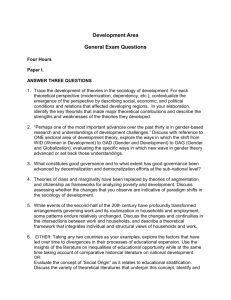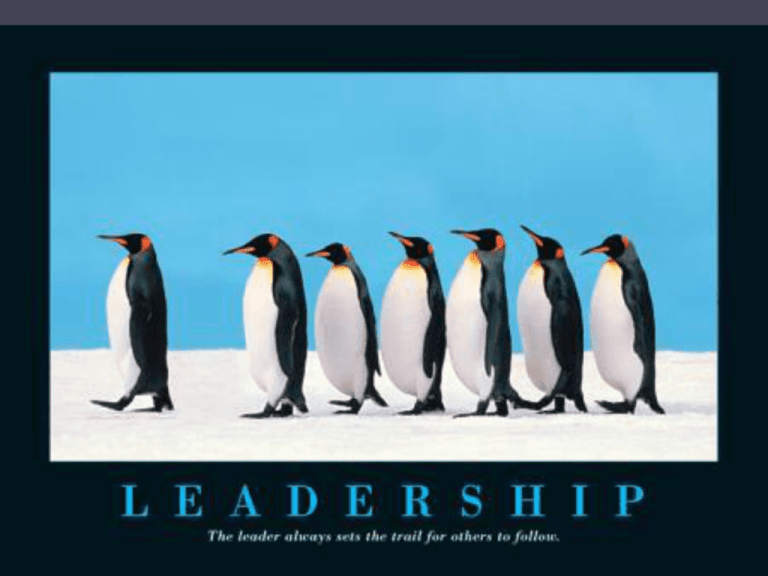
Section 12
Effective Leadership Processes
Leadership- Tutu
Leaders are Readers
• Warren Bennis
• On Becoming a Leader (2003)
• “…more leaders have been made by accident,
circumstance, sheer grit, or will than have been
made by all the leadership courses put together.”
Must Know: Leadership…
• Is just influence
• Happens, constantly,
conscious or unconscious
• happens in a contextALWAYS
• Good followers usually
required
• diffuses through levels
• Matters to people
• Matters to the bottom line
• Can be developed
• Can be viewed as traits, styles
or relationships
• Is necessarily tied with power
• Can be individual or shared
• Is in all social contexts
• Has been studied scientifically
for over 100 years
• Can be a transaction or
identification process
• Attributions are diffused
through social networks
• Differs by gender
• Differs by values
• Differs by culture
• Is emergent
Things that lead to leadership
• Individual Factors
▫ Cognitions
▫ Emotions
▫ Behaviors
• Group/Team Factors
▫ Idiosyncratic Credit
▫ Follower behaviors predict leadership
• Contextual Factors
▫ Crises
▫ Incompetent/Untrusted leader
Jack Welch (Winning)
“Before you are a leader success is
about growing yourself. After you
become a leader success is about
growing others”.
Jack Welch on authenticity (Winning)
• “Candor is the biggest little dirty secret in business”
• “lack of candor basically blocks smart ideas, fast action and good
people contributing all they’ve got.”
• “When you’ve got candor, everything just operates faster and
better.”
• Candor: 1) gets more people in the conversation, 2) generates the
ability to debate rapidly (the 5 person start-up down the street can
move faster than you. Candor is a way to keep up), 3) Cuts costs (all
the meaningless reports and conversations that unnecessarily
“frame” or “spin” things.
• “To get candor you reward it, praise it and talk about it. You make
public heroes out of those to demonstrate it”.
• “Candor works because candor unclutters”
Jack Welch on Strategy Implementation (Winning)
• “More than a few times over the past three years I have been on a speaking
program or at a business conference with one big strategy guru or another.
And more than a few times I have listened to their presentations in
disbelief. It’s not that I don’t understand their theories about competitive
advantage, core competencies, virtual commerce, supply chain economics,
disruptive innovation and so no, it’s just that the way these experts tend to
talk about strategy—as if it were some kind of high brain scientific
methodology—feels really off to me. I know strategy is a leaving, breathing
totally dynamic game. It’s fun—and fast. And it’s alive. Forget the arduous
intellectualized number crunching and data grinding that gurus say you
have to go through to get strategy right. Forget the scenario planning, yearlong studies and hundred plus page reports. They are time consuming and
expensive and you just don’t need them. In real life, strategy is actually
very straight forward. You pick a general direction and implement like
hell.”
• Counter this with Moneyball
Leadership & Followership
Leadership - the process of guiding & directing the
behavior of people in the work environment
Formal leadership - the officially sanctioned
leadership based on the authority of a formal
position
Informal leadership - the unofficial leadership
accorded to a person by other members of the
organization
Followership - the process of being guided &
directed by a leader in the work environment
Leaders and Managers
Personality
Dimension
Manager
Leader
Attitudes toward Impersonal, passive,
Personal, active, goals arise
goals
functional; goals arise out of from desire, imagination
necessity, reality
Conceptions of
work
Combines people, ideas,
things; seeks moderate risk
Looks for fresh approaches to
old problems; seeks high risk
Relationships
with others
Prefers to work with others;
avoids close relationships
and conflicts
Comfortable in solitary work;
encourages close relationships,
not averse to conflict
Accepts life as it is;
unquestioning
Questions life; struggles for
sense of order
Sense of self
SOURCE: Reprinted by permission of Harvard Business Review. From A. Zaleznik, “Managers and Leaders: Are They Different?” Harvard Business Review 55 (1977): 67-77. Copyright
© 1977 by the Harvard Business School Publishing Corporation; all rights reserved.
What is Leadership?
What is Leadership?
CHANGE
The Historically Important
Studies on Leadership
• The Iowa Leadership Studies
▫ Autocratic vs. Democratic vs. Laissez-Faire
• The Ohio State Leadership Studies
▫ Initiating Structure vs. Consideration
• The Early Michigan Leadership Studies- human
relations approach
▫ Production Oriented vs. Employee Oriented
Traditional Theories of Leadership
• Trait Theories of Leadership
▫ The role of intelligence
▫ Physical attributes
▫ Associated with charismatic
leadership?
• Group and Exchange Theories
of Leadership
▫ Followers’ Impact on
Leaders
▫ The Leader-Member
Exchange (LMX) Model
(Continued)
Traditional Theories of Leadership
Contingency Theory of
Leadership
▫ Fielder’s Contingency
Model of Leadership
Effectiveness
▫ Research Support for the
Contingency Model
▫ Fielder’s Contingency
Theory in Perspective
(Continued)
Fiedler’s Contingency Model
(Continued)
House’s Path-Goal Theory
What is Leadership Moving
Forward?
Modern Theoretical Processes of
Leadership
Charismatic Leadership
Theories
▫ Identification
▫ Personalized and Socialized
▫ Leader Behaviors and
Words
Vision
Ideal Future State
Unconventional Behavior
▫ Follower Reactions
Unwavering Loyalty
Censor opponents to leader
Speech by Charismatic Leader
Modern Theoretical
Processes of Leadership
(Continued)
Transformational vs. Transactional
• This perspective
▫
▫
▫
▫
Dominates leadership research
Is easy to see in action
Is intuitive
Is most helpful for leadership
development
▫ Assumes a range of leadership
behaviors from non-leadership
to charismatic leadership
The Full Range Model
Leaders are Readers
•
•
•
•
Leadership is BEHAVIOR
The Leadership challenge (2007)
Kouzes and Posner
“Leadership is not a gene and it’s not an
inheritance. Leadership is an identifiable set of
skills and abilities that are available to all of us”
(Continued)
Modern Theoretical Processes of Leadership
• Pygmalion Effect
• Substitutes for Leadership
• Leadership across Cultures
▫ Personal Values
▫ Backgrounds of the Managers
▫ Interpersonal Skills
• Project GLOBE and the Future of International
Leadership Studies
(Continued)
Modern Theoretical Processes of Leadership
• Authentic Leadership
▫
▫
▫
▫
Self Awareness
Balanced Processing
Transparency
Moral Component
• How to win Friends and Influence People
• Dale Carnegie 1998
• “Talk about your own mistakes first”
Questions

